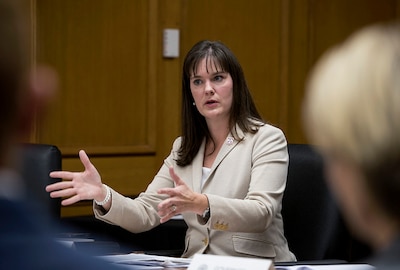About 45,000 students in a third of Tennessee districts will log on Tuesday for a 40-minute simulation to make sure the state’s testing company has worked the bugs out of its online platform.
That platform, called Nextera, was rife with glitches last spring, disrupting days of testing and mostly disqualifying the results from the state’s accountability systems for students, teachers, and schools.
This week’s simulation is designed to make sure those technical problems don’t happen again under Questar, which in June will finish out its contract to administer the state’s TNReady assessment.
Tuesday’s trial run will begin at 8:30 a.m. Central Time and 9 a.m. Eastern Time in participating schools statewide to simulate testing scheduled for Nov. 26-Dec. 14, when some high school students will take their TNReady exams. Another simulation is planned before spring testing begins in April on a much larger scale.
The simulation is expected to involve far more than the 30,000 students who will test in real life after Thanksgiving. It also will take into account that Tennessee is split into two time zones.
“We’re looking at a true simulation,” said Education Commissioner Candice McQueen, noting that students on Eastern Time will be submitting their trial test forms while students on Central Time are logging on to their computers and tablets.
The goal is to verify that Questar, which has struggled to deliver a clean TNReady administration the last two years, has fixed the online problems that caused headaches for students who tried unsuccessfully to log on or submit their end-of-course tests.
Here’s a list of everything that went wrong with TNReady testing in 2018
The two primary culprits were functions that Questar added after a successful administration of TNReady last fall but before spring testing began in April: 1) a text-to-speech tool that enabled students with special needs to receive audible instructions; and 2) coupling the test’s login system with a new system for teachers to build practice tests.
Because Questar made the changes without conferring with the state, the company breached its contract and was docked $2.5 million out of its $30 million agreement.
“At the end of the day, this is about vendor execution,” McQueen told members of the State Board of Education last week. “We feel like there was a readiness on the part of the department and the districts … but our vendor execution was poor.”

She added: “That’s why we’re taking extra precautions to verify in real time, before the testing window, that things have actually been accomplished.”
By the year’s end, Tennessee plans to request proposals from other companies to take over its testing program beginning in the fall of 2019, with a contract likely to be awarded in April.
The administration of outgoing Gov. Bill Haslam has kept both of Tennessee’s top gubernatorial candidates — Democrat Karl Dean and Republican Bill Lee — in the loop about the process. Officials say they want to avoid the pitfalls that happened as the state raced to find a new vendor in 2014 after the legislature pulled the plug on participating in a multi-state testing consortium known as PARCC.
Why state lawmakers share the blame, too, for TNReady testing headaches
“We feel like, during the first RFP process, there was lots of content expertise, meaning people who understood math and English language arts,” McQueen said. “But the need to have folks that understand assessment deeply as well as the technical side of assessment was potentially missing.”

